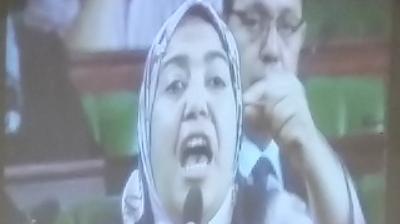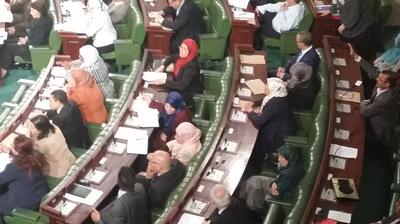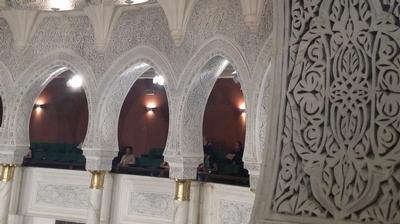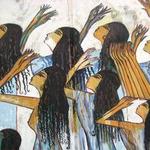The balancing act of moderate Islamist politics in Tunisia
The Tunisian Parliament is housed in the former Bey’s palace in the Bardo neighborhood of Tunis. It is connected to the now infamous Bardo-museum, which takes up parts of the same palace. Presidential guard now heavily guards the building, as well as military personnel, cars are screened for bombs with mirrors, and all guests must have an appointment to be admitted into the Parliament. The building itself is beautiful, with panels of colorful tiling and painted roofs. The plenary sessions take part inside a hall covered by a domed ceiling bedecked in intricate white carvings. Observers, guests and press are granted access to the gallery. The different parties sit in clusters around the hall. Biggest party Nidaa Tounes to the left, and – distinguishable by the large number of women in their ranks – most of them veiled, moderate Islamist movement, Ennahda, in the center, followed by the smaller parties to the right.

A veiled flight attendant caused uproar in the Tunisian Parliament Tuesday 5April. During a session where the Minister of Transport was informing the Parliament, he briefly brushed up on an issue that has been highlighted in Tunisian media lately – the issue of a Tunisair flight attendant who supposedly has lost her job over her insistence to wear a veil with her uniform. The minister was informing the Parliament that he has set down a commission to investigate the case.
The case in question is that Tunisair’s uniforms do not include a headscarf, and as signatory to the job contract, Tunisair believes the woman mentioned is under obligation to obey the uniform demands. However, since the revolution, women in Tunisia have been arguing for their right to freely choose the veil. The Tunisair case highlights several aspects affecting women in Tunisia today, and hits several fault lines in Tunisian politics. As such, it is a highly flammable issue, as we will see.
When the minister of transport mentioned the case of the flight attendant, Parliament broke out in shouting and MP’s begun banging their desks. The Ennahda wing in particular made a raucous. It took the president of the Parliament several tries with both his club as well as angry yelling, before the hall settled. He allowed for an unscheduled speaker from Ennahda. A veiled woman in a pink suit got the microphone and started yelling. Her argument was that a woman’s choice to wear the veil was part of her basic freedoms (the freedoms fought for in the 2011 revolution). She went on to shout that this case had the distinct feeling of the former regime! As Nidaa Tounes often has been linked to the former regime this was also an accusation to the party which the minister belongs to. She said it was unbearable that a woman was out of a job due to her wish to veil.
The argument went on, and an unveiled woman from Nidaa Tounes was given speaking time, and she claimed to have from a secure source, that the flight attendant was not unemployed. However, the session’s purpose was not to discuss that case, and the delegates had not had the chance to prepare, so another session for the case of the flight attendant should be scheduled.
As the case continued to be addressed – the woman in pink from Ennahda slipped out. I was later told she had begun to weep. As an Islamist woman she had bad memories of the times under the former regime where the veil was either banned (in official institutions), or ensured discrimination of the wearer.

As MP Farida Abidi told me during our interview after this session, she was one of the many members of today’s Ennahda who were imprisoned due to their Islamist sympathies under the former regime. Several women felt that they were held back in their careers due to insisting on wearing the veil. However, “it did not stop us”. She claimed that many women took off the veil in this period in order to advance their careers, studies and skills. She said this is part of the reason why today, Ennahda sports so many competent female leaders.
The debate over the veil in Tunisia today is a debate that goes much deeper than the piece of cloth. The debate is over the basic human freedoms both Islamists and others fought for during the revolution. It is very clear that in Tunisia, Islamist women and men gained the freedom to express themselves in religious idioms and with a clear religious background through the revolution. These freedoms are not taken for granted, and after the deep political crisis which led to Ennahda stepping out of government in 2012, they are eager to not be pushed out of the public discourse. This does however require some heavy duty maneuvering. In the 2014 constitution, we do for example not see any hint of the heavily disputed article 28 that suggested designating men and women as complimentary rather than equal. This, as well as a reference to sharia’ as a basis for the country’s laws were both points where the Islamist wing had to back down.
Today, the identity of both the country, as well as the largest Islamist movement, Ennahda are up for discussion. The question of whether Islam should maintain the basis for Ennahda will be up for discussion in the party’s upcoming congress. The Ennahda movement as it is still called (rather than Ennahda party) is considering and discussing whether they should redefine themselves as a conservative party, without the explicit reference to Islam.
In an environment where Ennahda is by some linked explicitly to the fundamentalist Islam which is seen threatening the borders of Tunisia, and even within, Islam as a political project and political identity is a very difficult position to maintain. Moderate Islamist politics is an art of balancing, and it seems that Ennahda is currently managing this. “We are fully committed to the nation’s interest” member of Ennahda’s Shoura Council, Emna Dridi tells me and highlights the movement’s stepping down from power in 2012.
The veil, however, is a “safe” topic. Ennahda can safely protect women’s right to wear the veil as it resonates with the post-revolutionary discourse of basic human freedoms. Despite this, the sore memories of imprisonment, discrimination, and in some instances torture, color the reactions of the movement’s MPs when the questions of a woman’s right to veil is brought up. In a post-revolutionary state where the process of truth and reconciliation is still on the drawing board, along with the process for implementing the constitution of 2014, the emotional aspects of certain political questions has not been dealt with.
To (not) conclude, the debates concerning the role Islam should play in public life are still raging, and this is why a veiled Tunisair flight attendant can cause uproar in the Tunisian Parliament.





